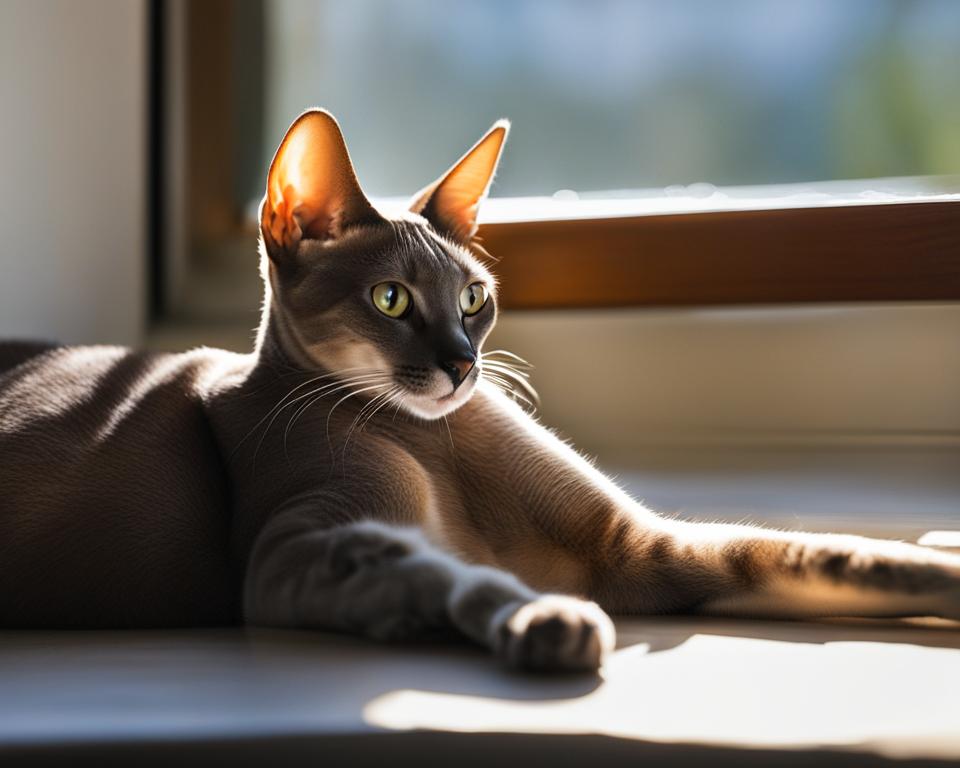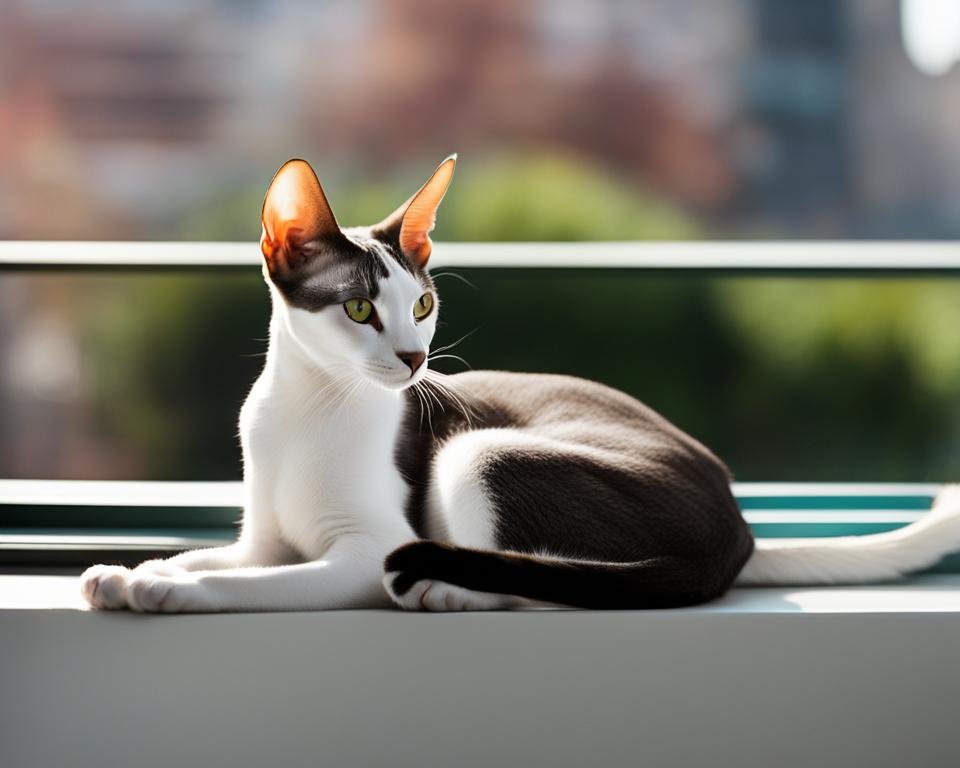Oriental Shorthair cats are unique and have specific health considerations. They are known for being energetic, playful, and good companions. However, they may have some health issues that owners should be aware of. Some common health problems in Oriental Shorthairs include obesity, dental disease, and vaccine-preventable infections. It’s important to provide proper weight management, regular dental care, and vaccinations to maintain their health and prevent potential problems.
- Oriental Shorthair cats are prone to obesity, dental disease, and vaccine-preventable infections.
- Proper weight management through diet and exercise is crucial to prevent health problems.
- Regular dental care, including daily tooth brushing, is essential to maintain oral health.
- Vaccinations are highly recommended to protect Oriental Shorthairs from infections.
- Preventive measures, such as regular testing and medication, can help prevent parasite infestations.
- Spaying or neutering Oriental Shorthair cats not only prevents unwanted litters but also has health benefits.
- Prioritize your Oriental Shorthair’s health by providing necessary care and regular veterinary check-ups.
Tips for Preventing Health Problems in Oriental Shorthair Cats
Oriental Shorthair cats are prone to certain health issues, but with proper care and attention, many of these problems can be prevented. Here are some essential tips for managing the health of your Oriental Shorthair cat:
1. Maintain a Healthy Weight
Obesity is a significant concern for Oriental Shorthair cats, as it can lead to various health problems. To prevent excessive weight gain, provide your cat with a balanced diet and monitor their caloric intake. Avoid overfeeding and opt for high-quality cat food that meets their nutritional needs. Regular exercise and interactive play sessions are also crucial for keeping your cat active and maintaining a healthy weight.
2. Practice Good Dental Care
Dental disease is common in Oriental Shorthair cats and can lead to pain, infection, and other complications. Establish a dental care routine that includes daily tooth brushing using a pet-specific toothbrush and toothpaste. Additionally, offer dental-friendly treats or toys to promote oral hygiene. Regular dental check-ups with your veterinarian will ensure any potential dental issues are addressed promptly and prevent further complications.
3. Schedule Regular Veterinary Check-ups
Regular veterinary check-ups are vital for managing the overall health of your Oriental Shorthair cat. During these visits, your veterinarian can assess your cat’s weight, dental health, and overall well-being. They can also provide guidance on preventive measures, vaccinations, and any specific health concerns associated with the breed. By staying proactive and seeking professional care, you can address potential health issues early and prevent them from becoming more serious.
| Preventive Health Measures | Benefits |
|---|---|
| Regular exercise and balanced diet | Helps maintain a healthy weight and prevent obesity-related health issues |
| Daily tooth brushing | Reduces the risk of dental disease and associated complications |
| Scheduling regular veterinary check-ups | Allows for early detection of health problems and timely intervention |
By following these tips and providing your Oriental Shorthair cat with proper care and attention, you can help ensure their overall health and well-being.
Dental Care for Oriental Shorthair Cats
Regular dental care is crucial for maintaining the overall health and well-being of Oriental Shorthair cats. These elegant felines are prone to dental disease, which if left untreated, can lead to serious health issues. By implementing proper dental care practices, you can help prevent dental problems and ensure your Oriental Shorthair has a healthy smile.
One of the best practices for maintaining your Oriental Shorthair’s dental health is daily tooth brushing. Just like humans, cats can develop plaque and tartar buildup on their teeth, leading to gum disease and tooth decay. By brushing their teeth daily with a feline-friendly toothbrush and toothpaste, you can remove the buildup and reduce the risk of dental problems. It’s important to introduce tooth brushing gradually and make it a positive experience for your cat.
In addition to tooth brushing, removing food residue regularly is essential for preventing dental disease. This can be done by offering dental treats or using dental rinses approved by your veterinarian. Routine dental exams by a professional are also crucial for assessing your cat’s dental health. During these exams, your veterinarian can identify any potential issues and recommend appropriate treatments or dental cleanings.
| Dental Care for Oriental Shorthair Cats | Recommendations |
|---|---|
| Daily tooth brushing | Brush your cat’s teeth with a feline-friendly toothbrush and toothpaste on a daily basis to remove plaque and tartar buildup. |
| Food residue removal | Offer dental treats or use dental rinses approved by your veterinarian to remove food residue from your cat’s teeth. |
| Routine dental exams | Schedule regular dental exams with a professional to assess your cat’s dental health and identify any potential issues. |
By following these best practices for dental care, you can ensure that your Oriental Shorthair cat maintains good oral health and reduces the risk of dental disease. Remember, prevention is key, so establishing good dental hygiene habits early on can significantly benefit your cat’s overall health and well-being.
Oriental Shorthair Cat Health Problems Guide
Oriental Shorthair cats, like all cats, are susceptible to certain bacterial and viral infections. Vaccination plays a crucial role in protecting them from these diseases. In addition to core vaccines, there are specific vaccines available to prevent other dangerous conditions like feline leukemia virus (FeLV). It is important to consider the prevalence of these diseases and your cat’s age and lifestyle when making vaccination decisions. By ensuring proper vaccination, you can help prevent these infections and safeguard the health of your Oriental Shorthair.
Common Vaccine-Preventable Infections
There are several vaccine-preventable infections that Oriental Shorthair cats are vulnerable to:
- Panleukopenia: Also known as feline distemper, this highly contagious viral infection can be life-threatening. Vaccination is crucial to protect your cat from this disease.
- Calicivirus: This respiratory infection can cause fever, sneezing, and mouth sores. Vaccination helps prevent the spread and severity of this virus.
- Rhinotracheitis: Also called feline herpesvirus-1, this infection affects the respiratory system and can lead to severe illness. Vaccination is essential to reduce the risk and severity of symptoms.
- Rabies: A fatal viral infection that affects the nervous system and can be transmitted to humans. Rabies vaccination is essential to protect both your cat and yourself.
It is important to consult with your veterinarian to determine the appropriate vaccination schedule for your Oriental Shorthair cat. They will consider factors such as your cat’s age, health status, and potential exposure to certain diseases. Regular vaccination not only protects your cat from potentially life-threatening infections but also contributes to the overall well-being of your beloved feline companion.
| Vaccine | Recommended Schedule | Description |
|---|---|---|
| Panleukopenia Vaccine | Starting at 8 weeks, boosters every 3-4 weeks until 16 weeks, then annual boosters | Protects against feline distemper, a highly contagious and potentially fatal viral infection. |
| Calicivirus Vaccine | Starting at 8 weeks, boosters every 3-4 weeks until 16 weeks, then annual boosters | Provides immunity against calicivirus, a respiratory infection that can cause fever, sneezing, and oral ulcers. |
| Rhinotracheitis Vaccine | Starting at 8 weeks, boosters every 3-4 weeks until 16 weeks, then annual boosters | Prevents feline herpesvirus-1 infection, which can cause respiratory illness and eye infections. |
| Rabies Vaccine | Starting at 12-16 weeks, boosters every 1-3 years depending on the vaccine type | Provides protection against rabies, a deadly viral infection that affects the nervous system. |
Oriental Shorthair Cat Health Problems Guide: Parasite Prevention
Oriental Shorthair cats are beloved companions known for their unique traits and charm. However, like all cats, they are prone to various parasites that can impact their health. Preventing and managing parasites is crucial for ensuring the well-being of Oriental Shorthair cats.
Common Parasites that Affect Oriental Shorthair Cats
There are several parasites that Oriental Shorthair cats are susceptible to:
- Fleas: These external parasites can cause itching, skin irritation, and even transmit diseases.
- Ticks: Ticks can transmit serious diseases to cats, including Lyme disease and babesiosis. Regular tick checks and prevention are essential.
- Ear Mites: Ear mites are common in cats and can cause discomfort, itching, and inflammation in the ears.
- Intestinal Worms: Worms like roundworms, tapeworms, and hookworms can affect the digestive system of Oriental Shorthair cats, leading to weight loss, poor appetite, and other health issues.

Preventive Measures for Parasite Control
Prevention is key in protecting Oriental Shorthair cats from parasites. Here are some important preventive measures:
- Regular Veterinary Check-ups: Schedule regular visits to your veterinarian for comprehensive check-ups and preventive treatments tailored to your cat’s needs.
- Fecal Exams: Fecal exams can detect the presence of intestinal worms and other parasites. These tests help your veterinarian determine the appropriate deworming treatments.
- External Parasite Prevention: Use veterinarian-recommended flea and tick prevention products to keep these pests at bay. Regular grooming and thorough inspections can also help spot any signs of fleas or ticks.
- Environmental Hygiene: Keep your cat’s living environment clean and free from parasites. Regularly wash bedding and vacuum your home to minimize the risk of infestations.
Spaying or Neutering and Overall Health for Oriental Shorthair Cats
Spaying or neutering your Oriental Shorthair cat is an important step in maintaining their overall health. This procedure not only helps prevent certain types of cancers but also eliminates the risk of unplanned litters. By spaying or neutering, you are taking a proactive approach to ensuring the well-being and longevity of your beloved feline companion.
In addition to reducing the risk of cancer, spaying or neutering can have behavioral benefits as well. Male cats that are neutered are less likely to exhibit territorial behaviors and spraying, while females that are spayed will not experience heat cycles. This can lead to a calmer and more contented cat, enhancing their overall quality of life.
Moreover, the spaying or neutering procedure provides an opportunity for your veterinarian to identify and address potential health issues. Prior to the surgery, routine blood testing can be conducted to detect common problems that may increase the surgical risk. By addressing any health concerns early on, you are taking proactive steps towards maintaining your Oriental Shorthair’s optimal health.
Overall, spaying or neutering your Oriental Shorthair cat is not only a responsible decision but also a crucial aspect of their health and well-being. By preventing unwanted litters, reducing the risk of certain cancers, and addressing potential health issues, you are ensuring a longer and healthier life for your beloved feline companion.
FAQ
What are some common health problems in Oriental Shorthair cats?
Common health problems in Oriental Shorthair cats include obesity, dental disease, vaccine-preventable infections, and parasitic infections.
How can I prevent obesity in my Oriental Shorthair cat?
To prevent obesity in Oriental Shorthair cats, provide regular exercise and a balanced diet, feed the appropriate amount of high-quality cat food, and engage in interactive play.
What can I do to maintain my Oriental Shorthair cat’s dental health?
To maintain dental health in Oriental Shorthair cats, establish good dental hygiene habits such as daily tooth brushing, remove food residue regularly, and schedule routine dental exams with a veterinarian.
What vaccine-preventable infections should I be concerned about for my Oriental Shorthair cat?
Oriental Shorthair cats are vulnerable to infections such as panleukopenia, calicivirus, rhinotracheitis, rabies, and feline leukemia virus (FeLV). Vaccination is highly recommended to protect them from these diseases.
How can I prevent parasitic infections in my Oriental Shorthair cat?
Regular testing and preventive medication are essential for preventing parasitic infections in Oriental Shorthair cats. Fecal exams can detect many parasites, and preventive medication can be prescribed based on the test results.
What are the benefits of spaying or neutering my Oriental Shorthair cat?
Spaying or neutering your Oriental Shorthair cat reduces the risk of certain cancers, eliminates the possibility of unplanned litters, decreases territorial behaviors and spraying in males, and allows the veterinarian to identify and address any potential health issues.

Leave a Reply